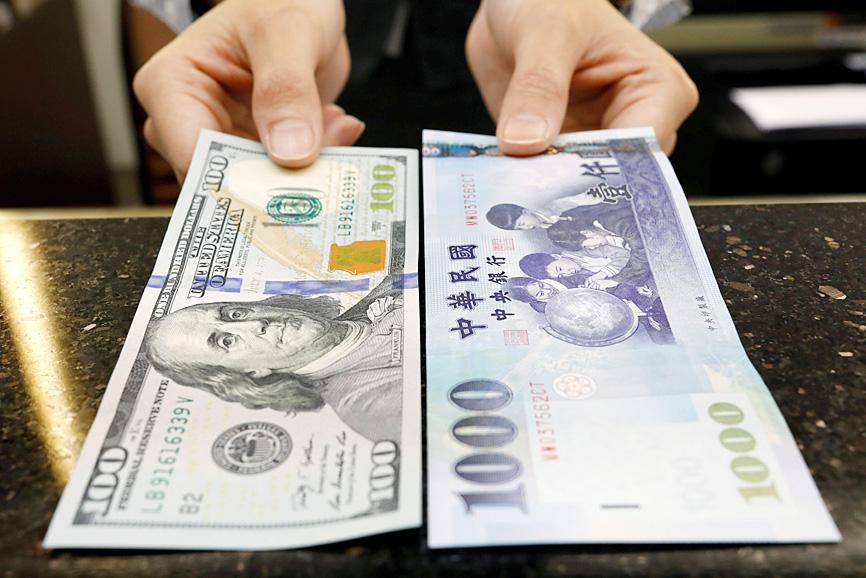The New Taiwan dollar yesterday posted its biggest daily advance since December last year after a report by the US Department of the Treasury last week hinted that US President Joe Biden’s administration could exert greater pressure on Taiwan’s central bank to allow the local currency to appreciate.
The NT dollar rose 0.5 percent to close at NT$28.205 against the greenback, and was emerging Asia’s best-performing currency for the day.
While the Treasury report on Friday did not label Taiwan as a currency manipulator, it said the US would initiate “enhanced bilateral engagement” to address what it considers as “structural undervaluation” of the exchange rate.

Photo: Reuters
“Despite the relief of not being labeled a currency manipulator, the Treasury report still urged Taiwan authorities to limit FX intervention to exceptional circumstances,” Mizuho Bank Ltd chief Asian FX strategist Ken Cheung (張建泰) said. “This, alongside the strong exports, will help support the Taiwan dollar.”
The NT dollar has come under scrutiny as the tech-dependent economy posts a quicker recovery from the COVID-19 pandemic than most of its peers in Asia.
While the central bank does not deny intervening in currency markets, it pushed back against aspects of the US assessment.
The NT dollar is close to being at a balanced level based on the IMF’s valuation model, the central bank said as it urged the US to ease monitoring of trading partners during the pandemic.
“[US Secretary of the Treasury Janet] Yellen is pragmatic and prudent,” central bank Governor Yang Chin-long (楊金龍) told lawmakers yesterday when discussing the Treasury report. “We need to show more than just our sincerity about communicating with the US.”
Taiwan has already held two meetings with the Treasury this year over its currency, Yang said.
The central bank only intervenes when there are concerns about supply and demand in the market, he added.
Regular late-session moves by state-backed banks to pare gains by NT dollar against the US dollar are “a kind of intervention,” Yang had told reporters late last month.
For months, the currency could rise more than 1 percent during the day, only to pare back most of the advance at the close.
“There will still be pressure on Asian central banks to ease back on their intervention activity, which would lead to greater appreciation pressure,” Australia & New Zealand Banking Group Ltd head of Asia research Khoon Goh (吳昆) said. “The easing of US 10-year bond yields and the retreat in the [US] dollar of late has also helped the Taiwan dollar’s move.”

Taiwan would remain in the same international network for carrying out cross-border payments and would not be marginalized on the world stage, despite jostling among international powers, central bank Governor Yang Chin-long (楊金龍) said yesterday. Yang made the remarks during a speech at an annual event organized by Financial Information Service Co (財金資訊), which oversees Taiwan’s banking, payment and settlement systems. “The US dollar will remain the world’s major cross-border payment tool, given its high liquidity, legality and safe-haven status,” Yang said. Russia is pushing for a new cross-border payment system and highlighted the issue during a BRICS summit in October. The existing system

Taiwan Semiconductor Manufacturing Co (TSMC, 台積電) is expected to grow its revenue by about 25 percent to a new record high next year, driven by robust demand for advanced technologies used in artificial intelligence (AI) applications and crypto mining, International Data Corp (IDC) said yesterday. That would see TSMC secure a 67 percent share of the world’s foundry market next year, from 64 percent this year, IDC senior semiconductor research manager Galen Zeng (曾冠瑋) predicted. In the broader foundry definition, TSMC would see its market share rise to 36 percent next year from 33 percent this year, he said. To address concerns

Intel Corp chief financial officer Dave Zinsner said that a formal separation of the company’s factory and product development divisions is an open question that would be decided by the chipmaker’s next leader. Zinsner, who is serving as interim co-CEO following this month’s ouster of Pat Gelsinger, made the remarks on Thursday at the Barclays technology conference in San Francisco alongside co-CEO Michelle Johnston Holthaus. Intel’s struggles to keep pace with rivals — along with its deteriorating financial condition — have spurred speculation that the next CEO would make dramatic changes. That has included talk of a split of the company’s manufacturing

PROTECTIONISM: The tariffs would go into effect on Jan. 1 and are meant to protect the US’ clean energy sector from unfair Chinese practices, the US trade chief said US President Joe Biden’s administration plans to raise tariffs on solar wafers, polysilicon and some tungsten products from China to protect US clean energy businesses. The notice from the Office of US Trade Representative (USTR) said tariffs on Chinese-made solar wafers and polysilicon would rise to 50 percent from 25 percent and duties on certain tungsten products would increase from zero to 25 percent, effective on Jan. 1, following a review of Chinese trade practices under Section 301 of the US Trade Act of 1974. The decision followed a public comment period after the USTR said in September that it was considering